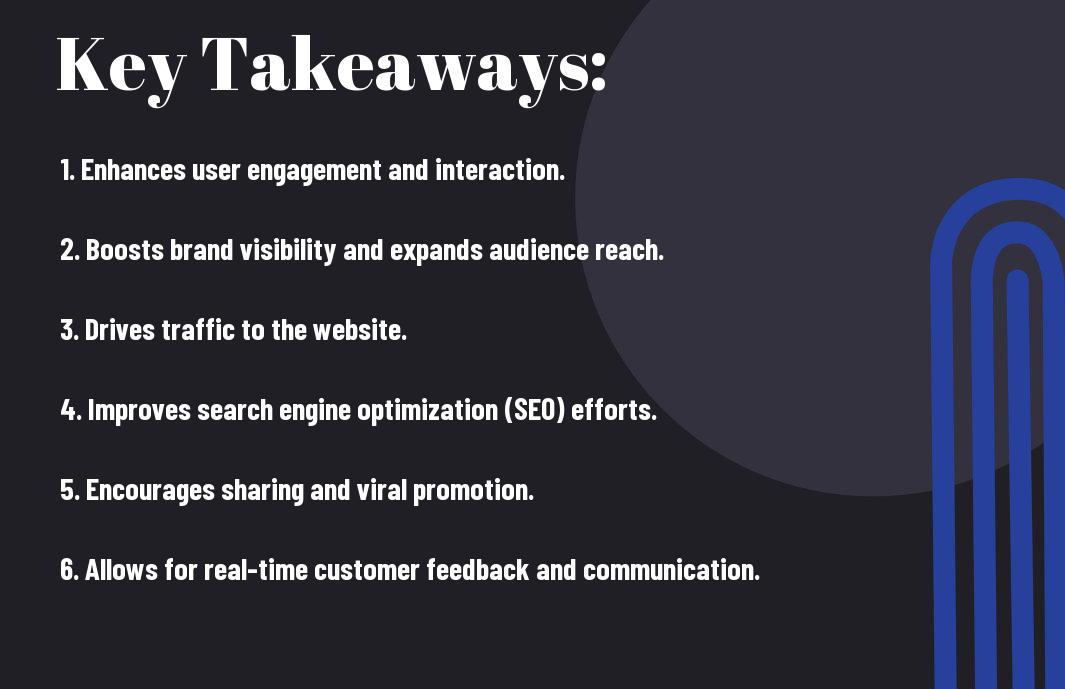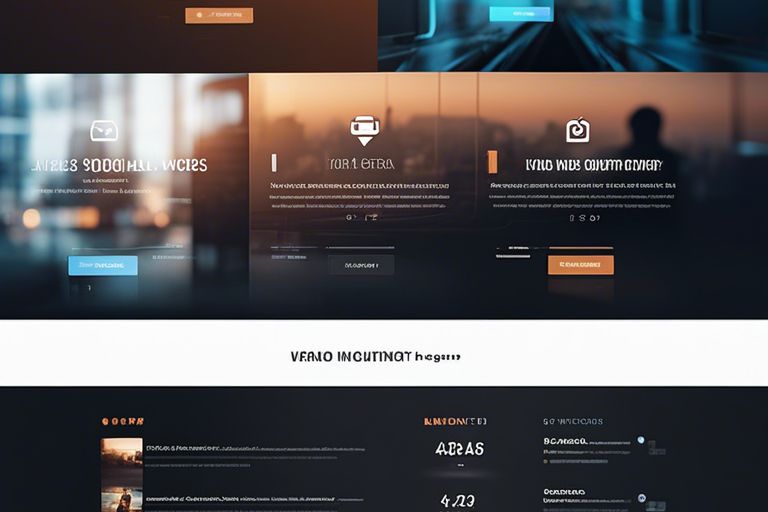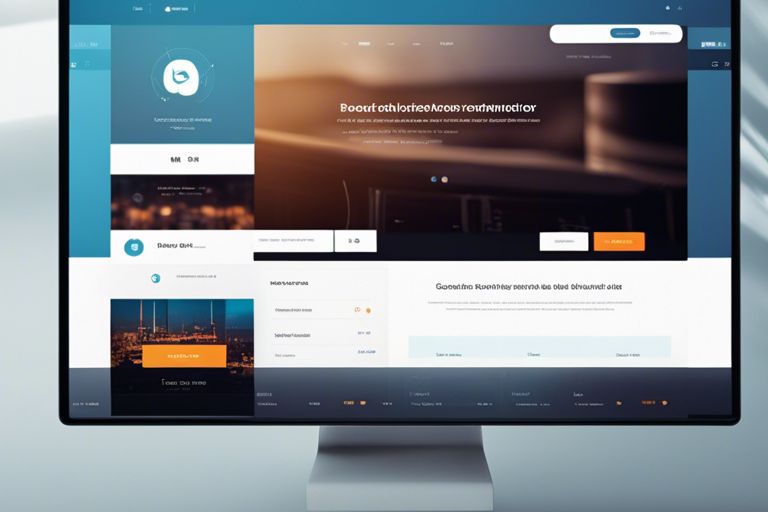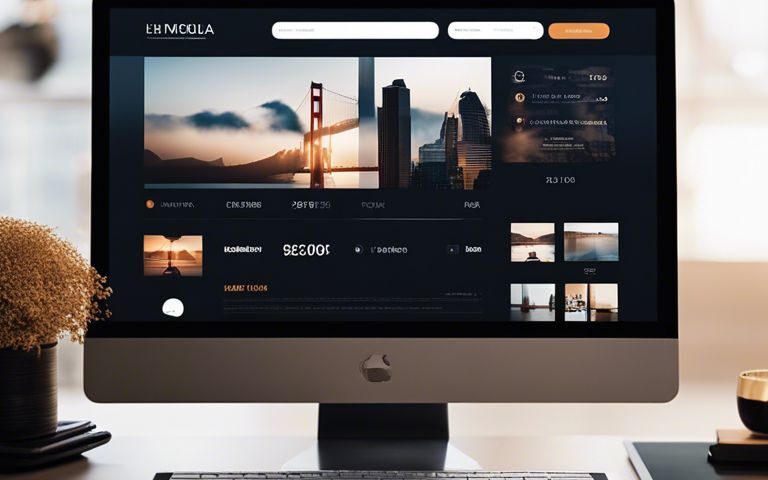The Importance Of Social Media Integration In Modern Website Design

Boost Your Online Presence With Professional Website Design Services
March 25, 2024
The Importance Of Social Media Integration In Modern Website Design
March 27, 2024You cannot underestimate the critical role that social media plays in modern website design. Integrating social media into your website is no longer just an option; it is a necessity if you want to stay relevant and competitive in today’s digital landscape. Maximizing your online presence through social media platforms can increase brand awareness, drive traffic to your site, and boost overall engagement with your audience. Neglecting to incorporate social media integration can limit your website’s reach and hinder its potential for growth. Stay ahead of the curve by recognizing the importance of social media integration in shaping the success of your website design.
Key Takeaways:
- Social media integration is crucial in modern website design to enhance brand visibility and engagement with the target audience.
- Integrating social sharing buttons on websites can increase traffic and promote content across various platforms.
- Providing seamless integration of social media feeds can boost user interaction and build trust with visitors.

Advantages of Social Media Integration
Enhanced User Engagement
User engagement is a key metric that can determine the success of your website. By integrating social media into your website design, you provide users with a seamless experience that encourages them to interact with your content and share it with their networks. This can lead to longer time spent on your site, increased comments, likes, and shares, as well as a higher likelihood of users coming back for more. For more information on integrating social media into your website design, check out Integrating Social Media into Your Website Design – POWR Blog.
Increased Traffic and Visibility
To drive more traffic to your website and improve your online visibility, social media integration is crucial. By connecting your website with popular social media platforms, you can reach a broader audience and attract new visitors. For instance, sharing your website content on social media channels can significantly boost your reach and engagement. Posting regularly and engaging with your followers can help build a loyal community around your brand. Additionally, social media shares can also improve your search engine rankings, leading to even more organic traffic to your site. Embracing social media integration is not just beneficial but crucial for modern website design.
Essential Components of Social Media Integration
After What are the benefits of integrating social media into website design, it is crucial to understand the vital components of social media integration in modern website design to enhance user engagement and expand online reach.
Social Sharing Features
One key component of social media integration is the inclusion of social sharing features on the website. These features allow users to easily share website content with their social media networks, increasing the visibility of the website and driving more traffic. By incorporating social sharing buttons for platforms such as Facebook, Twitter, and LinkedIn, visitors can seamlessly share interesting content with their connections with just a click.
Real-Time Social Feeds
Any modern website design should include real-time social feeds that display the latest posts and updates from the company’s social media accounts. This dynamic feature not only keeps the website content fresh and relevant but also encourages visitors to explore the brand’s social media presence. It creates a sense of immediacy and connection with the audience, showcasing the most current information and fostering brand loyalty. By integrating real-time social feeds, websites can provide up-to-the-minute updates and engage users in real-time interactions.

Best Practices for Integrating Social Media
Consistency across Platforms
One of the key best practices for integrating social media into your website is ensuring consistency across all platforms. This means maintaining a unified voice, visual style, and messaging strategy across your website and all associated social media channels. By providing a cohesive brand experience, you can build trust and loyalty with your audience, as they will recognize and resonate with your brand no matter where they encounter it.
Maintaining Brand Identity
Platforms such as Facebook, Twitter, Instagram, and LinkedIn each have their own unique formats and tone. Understanding how to adapt your brand identity to suit each platform while maintaining a core set of values and key messaging is crucial. By maintaining a consistent brand identity across all social media platforms, you can enhance brand recognition and establish a strong and coherent brand presence online.

Challenges and Solutions
Privacy Concerns and User Data
Solutions to privacy concerns and user data protection are crucial in social media integration. Not addressing these issues can lead to distrust among users and potential legal consequences. Implementing strict privacy policies, obtaining user consent before collecting data, and regularly auditing data practices are imperative measures to safeguard user information.
Platform updates and API changes
One challenge in social media integration is the constant updates and changes in platforms’ APIs. Solutions involve staying informed about industry trends and regularly updating website integrations to align with platform changes. This ensures seamless functionality and prevents disruptions in user experience.
One must be vigilant in monitoring platform updates and API changes to ensure smooth integration with social media platforms. Failure to adapt to these changes can result in technical errors and functional inconsistencies on the website, leading to user frustration and diminished engagement.
This proactive approach not only enhances user experience but also demonstrates a commitment to staying current with technological advancements in social media integration. Regularly testing and optimizing integrations can improve website performance and maintain user trust in the digital landscape.

To wrap up
Ultimately, integrating social media into modern website design is vital for businesses to succeed in today’s digital age. By leveraging the power of social platforms, businesses can increase brand visibility, engage with their audience, drive traffic to their website, and ultimately boost conversions. Social media integration not only enhances the user experience but also provides valuable insights into customer behavior and preferences. In a highly competitive online landscape, a strong social media presence can set businesses apart and help them stay relevant and connected with their target audience. Therefore, incorporating social media into website design is no longer optional but a strategic necessity for businesses looking to thrive in the ever-evolving digital world.
FAQ
Q: Why is social media integration important in modern website design?
A: Social media integration is important in modern website design because it allows businesses to connect with their audience, increase brand visibility, drive traffic to their website, and improve overall user engagement.
Q: How can social media integration benefit a website’s SEO?
A: Social media integration can benefit a website’s SEO by increasing the likelihood of content being shared, which can lead to more backlinks and improved search engine rankings. Additionally, social signals from platforms like Facebook and Twitter can also impact search rankings.
Q: What are some effective ways to integrate social media into a website?
A: Some effective ways to integrate social media into a website include adding social media sharing buttons to content, displaying live social media feeds on the site, embedding social media posts, and allowing users to log in using their social media accounts.
Q: How can social media integration help in building brand credibility?
A: Social media integration can help in building brand credibility by providing social proof through customer reviews, testimonials, and followers. When users see that a brand is active on social media and has a strong following, it can increase trust and credibility.
Q: What are the common challenges associated with social media integration in website design?
A: Some common challenges associated with social media integration in website design include maintaining a consistent brand voice across different platforms, keeping up with ever-changing social media trends and algorithms, and ensuring that social media content is in line with the overall website goals and messaging.


